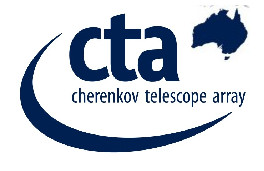Cherenkov Telescope Array Australia :
Consortium Workshop
7
University of Adelaide (North Terrace): 4 - 6 December 2018
Background
The CTA (Cherenkov Telescope Array) is a transformational next step in ground-based TeV
(1012eV) gamma-ray astronomy. It will utilise
the successful methods employed by HESS and others in the field
via an array of about 100 imaging Cherenkov telescopes in the Southerm Hemisphere located at Paranal Chile (About 20 telescopes will be
in the Northern Hemisphere at La Palma, Canary Islands).
CTA will be at least 10 times more sensitive than HESS, and cover a wider
energy range from about 20 GeV to well over 100 TeV. Many of the key science topics to be advanced by CTA are summarised in this
special edition of the
journal Astroparticle Physics. The much more detailed "Science With the CTA" is also available
here.
A consortium of six universities (U. Adelaide, UNSW, U. Sydney, U. West. Sydney, ANU, Monash) joined CTA in July 2013. ARC LIEF
funding in 2015 and 2017-21 has enabled the consortium to underpin its involvement by contributing hardware to the CTA telescopes.
Additional funding from NCRIS (via Astronomy Australia Ltd.) support Australia's engagement in CTA.
Workshop Purpose and Agenda
This two-and-a-half-day workshop follows on from our previous workshops (in 2013, 2015, Apr. 2016, Sept. 2016 , Apr. 2017
, Nov.
2017, Apr. 2018), and will disuss Australia's role in CTA and linkages with Australian activities in other areas of astronomy. The workshop is open to any astronomers interested in CTA and its
science.
1st CTA School
An extra feature of this workshop will be the CTA School. The School, to be run
by Sabrina Einecke, is aimed to introduce students/postdocs/anyone to the
analysis tools used to process high-level CTA data.
High-level data comprise event lists and instrument response functions - similar to the concept of
NASA's analysis software to analyse, for example, Swift-XRT or Fermi-LAT data.
The data to be used are from the first CTA data challenge. They have been
generated by CTA to estimate its science capabilities and tune its science
cases (https://arxiv.org/abs/1709.07997).
State-of-the-art physics models have been used as input for the simulations, such as known bright sources,
interstellar emission, and dark matter. Multiple datasets are available,
covering four of CTA's Key Science Projects: Galactic Plane Scan, Galactic
Centre Survey, Extragalactic Survey, and AGN monitoring.
The data challenge aims to develop high-level analysis tools (so-called science tools) and
engage people to get involved at an early stage. These tools are intended to
be used also by non-experts and non-CTA members, since CTA will be operated
as an open observatory, providing guest observer programs amongst
others.
Two science tools are currently under development:
gammapy and ctools. Both tools can be executed using the programming language python.
The School will cover the following topics, among others:
- Detection of sources
- Sky maps
- Spectral energy distributions
- Time variabilities
- Extended sources
Knowledge on how to analyse (especially low-level) data is not required for
the School. A short introduction on the steps and methods will be provided
during the School.
Experience with python is not required, but it is strongly recommended that
you familiarise yourself with basic functionalities. So-called ipython/jupyter notebooks
will be used for the tutorials. Helpful links will be provided together
with the installation instructions.
CTA School times:
Wednesday 5 Dec - start 15:00 approximately; finish 17:30
Thursday 6 Dec - start 09:00; finish 15:00 approximately.
More details on the CTA School, including downloading the software tools
etc., will be forthcoming.
Venue - University of Adelaide, North Terrace campus.
The meeting will be held at University
of Adelaide, North Terrace campus.
The workshop and school will be in Room 121 of the Physics Building.
A map to help you find it:
PDF map of the North Terrace
campus. The Physics building is at H8, with the main entrances located
facing the roadway between it and the Darling building immediately to its
north.
Accomodation
Rooms have been booked at Mansions on
Pulteney, a few minutes' walk south of the Physics Building, with arrival on
Monday December 3rd, and departure on Thursday December 6th.
(The Mansions hotel is located at S12 on the PDF
map of the university.)
We have 23 rooms block-booked, with three of those rooms being twin-share. Rooms have been reserved for the invited speakers.
However, for the accomodation, please email Sabrina Einecke (
sabrina.einecke@adelaide.edu.au ) if you wish to reserve a room at the block-booked
hotel, since we will take care of the booking.
We will need to secure bookings not later than about 30 days prior to the meeting, since
the cricket test starting the 6th of December places a high demand on accomodation.
Dinner (Tues 4 Dec. about 7pm)
Will be held at one of Adelaide's oldest hotels/pubs - British Hotel/Pub, map
Registration
Please register here, indicating if you want to present a talk, stay for the School,
and/or to indicate dietary requirements.
